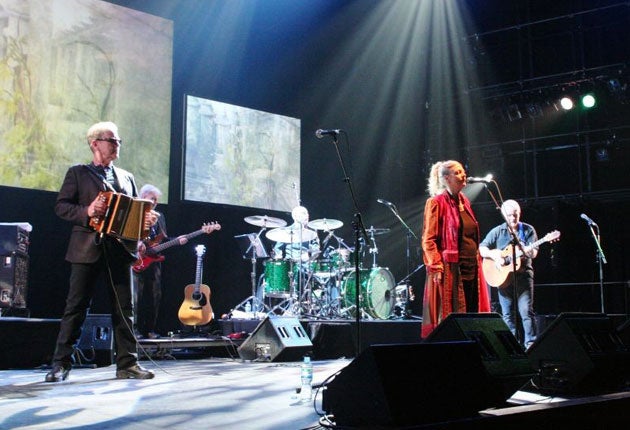June Tabor and Oysterband, Queen Elizabeth Hall, London

Your support helps us to tell the story
From reproductive rights to climate change to Big Tech, The Independent is on the ground when the story is developing. Whether it's investigating the financials of Elon Musk's pro-Trump PAC or producing our latest documentary, 'The A Word', which shines a light on the American women fighting for reproductive rights, we know how important it is to parse out the facts from the messaging.
At such a critical moment in US history, we need reporters on the ground. Your donation allows us to keep sending journalists to speak to both sides of the story.
The Independent is trusted by Americans across the entire political spectrum. And unlike many other quality news outlets, we choose not to lock Americans out of our reporting and analysis with paywalls. We believe quality journalism should be available to everyone, paid for by those who can afford it.
Your support makes all the difference.Twenty-one years after releasing their first album, Freedom and Rain, June Tabor and Oysterband return with Ragged Kingdom, a vibrant and rousing set whose slant is angled closer to the English folk tradition and the matter of magic, mystery, history, murder and mayhem deeply embedded within; it is no place for health and safety.
Tabor is renowned as English folk song's most melancholic voice, the queen of doom whose solo work is often a measured, intensely introspective affair. Here, the energy level is ramped up to match the visceral energy of the Oysters – including Ian Telfer on fiddle, singer John Jones on melodeon, Alan Prosser and Ray Cooper on cello and guitars, and a skintight rhythm section of Al Scott and Dil Davies.
Tabor and Oysterband have often performed on stage together – this new album was inspired by a gig at the Roundhouse in 2010 – and the intimate familiarity between the singer and the band, previewing material they've never played live before, made this album launch gig a real pleasure.
The set list ranges from Sixties counter culture with "All Tomorrow's Parties" and Jefferson Airplane's "White Rabbit", to the spiky rockabilly of set opener "Bonny Bunch of Roses", in which Napoleon is painted a hero, as Tabor notes at the song's end, "to Britain's poor and dispossessed". But Napoleon never came. He met his Waterloo – as does the brother in "Son David", an eerily jaunty tune tethered to a tale of fratricide, and the men of Shiloh in Tabor's spine-tingling rendition of Shel Silverstein's American Civil War song "The Hills of Shiloh". Folk's body count is high, with battle and departure lurking even in the wings of the slow-motion ecstatic rapture of "Fountains Flowing", a leave-taking song of great magic whose beautiful melody was later taken to fill the sails of John Bunyan's "To Be a Pilgrim".
Special mention must go to the setting both singers give the traditional songs they've made their own. Tabor frames her tribute to the role of the Travelling people in preserving great songs and a vital witnessing of history (you'll learn more about Napoleon from "Bonny Bunch of Roses" than from hours of bluster from Schama, Ferguson, Starkey et al) against events at Dale Farm. She shows that traditional music, as Ezra Pound might have had it, is news that stays news.
Join our commenting forum
Join thought-provoking conversations, follow other Independent readers and see their replies
Comments